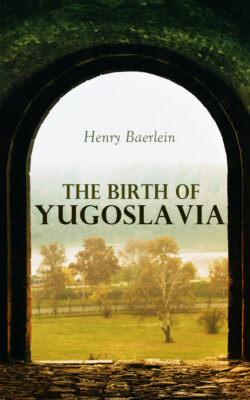Читать книгу The Birth of Yugoslavia - Henry Baerlein - Страница 71
На сайте Литреса книга снята с продажи.
THE CROATS, STRUGGLING FOR FREEDOM, INCIDENTALLY HELP AUSTRIA
ОглавлениеJellačić, on September 11, crossed the Drave with forty thousand Croats, annexed the territory between the Drave and the Mur, and advanced without opposition up to Lake Balaton. His commissary, General Joseph Brinjevac, occupied Rieka. They were confident that History would not misjudge them. "We demand," said Jellačić, in his declaration of war, "we demand equality of rights for all the peoples and for all the nationalities who live under the Hungarian crown." Before he left Zagreb he transformed the feudal Croatian Diet into an elective assembly. This new Parliament cancelled the institution of serfdom and proclaimed that one of their objects was to have the Habsburg monarchy a federation, on the model of Switzerland. One would suppose that it was clear to everyone that Jellačić was not fighting for the Habsburgs but for the subjected nationalities, and that if the vacillating Austrians who had outlawed him on account of his nationalist views later on joined him in his attacks on the Magyars, this does not show that he was fighting Austria's battles. "The banner which the Croats have unfurled," said Cavour in a great parliamentary speech a month later, "is a Slav banner, and in no way, as some people suppose, the banner of reaction and of despotism. … His [Jellačić's] chief, if not his only, aim was the redemption of the Slav nationality." This page would doubtless be more dignified if, after the dead lion, it did not refer to Mr. Edoardo Susmel; but since the autumn of 1918 a large number of people at Rieka have pinned their faith to Susmel rather than Cavour—his book was handed to me in a most impressive manner by the mayor. Let us see, therefore, what he says of 1848. "When the Croats," says he, "on account of national reasons"—so far we are with him—"and on account of their loyalty to Austria, on account of the desire of Jellačić and by order of the Emperor attacked Hungary, which was at that time fighting for freedom, they also threw themselves upon Rieka. … For the first and solitary time Rieka fell into the hands of the Croats. It was, wrote the contemporary Giacich, an enemy invasion." Mr. Susmel sails merrily ahead, for he knows that Truth is mighty and that it is said to prevail; but in order to convince the most captious he calls on Mr. Giacich to testify. I know nothing about Mr. Giacich except that he was a contemporary—and yet it seems that one ought not to wish that Mr. Susmel had rather put his faith in Cavour, who was also a contemporary, since that gentleman was far less capable and never could have proved that when a Croat army comes into a Croat town it is engaged upon an enemy invasion.
The Magyars were not to be repressed so easily, and Ferdinand made promise after promise to the Croats and the Serbs if they would help to overcome this people. From Serbia itself came many volunteers to aid their brothers who were trying to throw off the Magyar yoke; they came with the connivance of Prince Alexander, in fact, he sent one of his generals to lead them. And a great many hasty Kossuth enthusiasts in Western Europe, knowing only that the Magyars, a chivalrous nation, had been in arms against the despotic Habsburgs, and that the Serbs and Croats had a considerable share in subduing them, could not find invective virulent enough for this abominable brood of hell, whose one desire it was to be a tyrant's executioners. They were denounced as having not the least conception of independence; for a people of a disposition so abandoned there was not the faintest hope of any future; and the day would come when these outrageous little nations would be wiped away. Had not the noble Kossuth spoken like a prophet when he asked disdainfully where was Croatia, for he could not find it on the map?
In December the new Emperor, Francis Joseph, began to rule his variegated realm with justice. He confirmed the Serbian Patriarch and Voivoda, who had been chosen in the previous May, and he bestowed upon the Serbs of Syrmia and Bačka and the Banat a territory of their own, with their own organization and jurisdiction. Even a less extensive Serbian authority, namely, the Banat town of Velika Kikinda, with its ten dependent villages, raised its own taxes, had its own police and had the power of life and death. There was, indeed, a cloud which came across the Serbians' happiness when Čuplikac, the Voivoda, died suddenly. He was at Pančevo when he received from the Emperor the gracious edict and a box of cigars. No sooner had he mounted his horse, lit one of the cigars and uttered the word "Brother," than he fell down dead. As for the Croats, the Emperor made Jellačić governor of Dalmatia, which signified the union of that province to Croatia.
